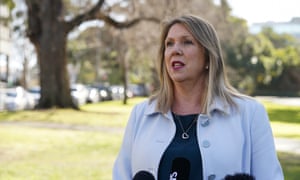Labor promises independent health policy body for ‘big, structural reform’

A Labor government would set up a permanent policy-making body called the Australian Health Reform Commission to address challenges such as chronic disease, cost barriers, long hospital waiting times and workforce shortages.
The shadow health minister, Catherine King, will announce the promise on Wednesday to implement an independent body similar to the Productivity Commission, with commissioners appointed for five years.
King says if Labor is elected, the commission’s priorities would be directed through the Council of Australian Governments (Coag). However, she flagged reform of primary care to deal with an ageing population, rising chronic disease burden and improving access to public hospital specialists as early priorities.
King will tell the National Press Club the policy was designed to ensure big reforms were not undermined by changes in government, the political cycle and cost shifting between state and commonwealth governments.
“The big, structural reform that’s so clearly needed has been repeatedly undermined by the short-term and combative nature of our political system,” King will say.
“At a federal level we have become stuck in a partisan cycle in which important, progressive Labor reforms are demolished by short-sighted Liberal governments.
“Just look at the way the current government reversed Labor’s progress on hospital funding reform; tore up our agreement with the states to put prevention at the heart of our health system; and trampled all over our ambitious Medicare Local program.”
The Rudd government set up the National Health and Hospitals Reform Commission, to develop a long-term health reform plan in 2009. Two years later, it brought down 120 recommendations, including a commonwealth takeover of hospital funding.
While the Labor government did not take up a takeover, it established funding agreements with the states and territories for an agreed share in funding growth.
However, the Abbott government pulled out of the state agreements in its 2014 budget, favouring more modest funding increases based on population growth and inflation. In 2015, the Abbott government abolished 61 Medicare Locals, set up by the Labor government to coordinate local health services in regional areas, and replaced them with 31 Primary Health Networks.
King believes the proposed Health Reform Commission will break the boom-bust cycle to develop longer-term reforms.
“It will transcend our three-year federal election cycle, while also finding ways to forge consensus across the commonwealth-state divide,” King will say.
The commission, which will need to be legislated, will deliver advice to commonwealth and state ministers as well as hold ministers accountable by reporting on progress on reforms.
“Its job will be to shepherd important innovations from their conceptual stage to reality – even when they take many years to deliver,” King will say.
“Its core mission will be simple – to find ways to improve the health outcomes for all Australians.”
[“source=theguardian”]


